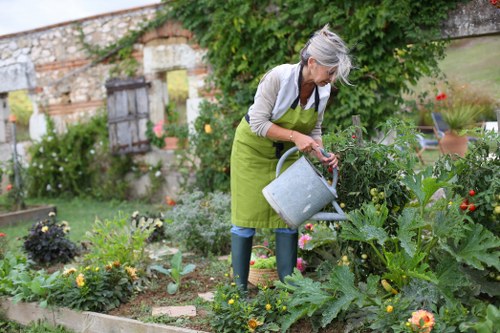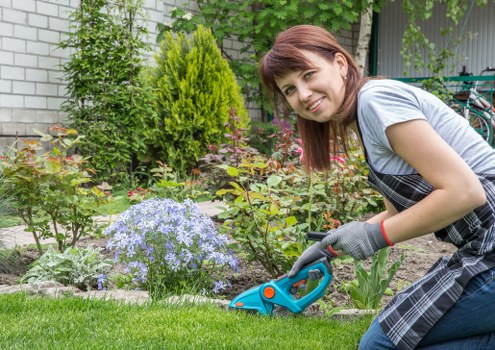Driveway Restoration Outside London

Is your driveway showing signs of wear and tear? Driveway restoration outside London can breathe new life into your home’s exterior, enhancing both its appearance and functionality. Whether you're dealing with cracks, fading, or uneven surfaces, professional restoration services can address these issues effectively.
Driveways endure harsh weather conditions, heavy use, and sometimes inadequate maintenance, leading to deterioration over time. Restoring your driveway not only improves curb appeal but also increases the value of your property. This article explores the benefits, processes, and key considerations for driveway restoration outside London.
Understanding the importance of driveway maintenance is the first step toward preserving your investment. A well-maintained driveway can prevent further damage, reduce repair costs, and ensure safety for your vehicles and pedestrians.

Why Restore Your Driveway?
Driveway restoration offers numerous advantages:
- Enhanced Curb Appeal: A fresh, restored driveway significantly boosts your home’s aesthetic appeal.
- Increased Property Value: Potential buyers are often attracted to properties with well-maintained exteriors.
- Cost-Effective: Restoration is generally more affordable than complete replacement.
- Safety Improvements: Fixing cracks and uneven surfaces reduces trip hazards.
These benefits make driveway restoration a smart investment for homeowners looking to maintain or increase their property's value.
Moreover, restoration is an eco-friendly option as it requires fewer resources compared to building a new driveway from scratch.

The Driveway Restoration Process
Assessment and Planning
Every restoration project begins with a thorough assessment of the existing driveway. Professionals evaluate the extent of damage, identify underlying issues, and recommend appropriate solutions. This step ensures that the restoration plan addresses all problems effectively.
Cleaning and Preparation
Cleaning the driveway is crucial for a successful restoration. This involves removing dirt, debris, stains, and any loose materials. Proper preparation ensures that the restoration materials adhere correctly and the finished surface is smooth and durable.
Repairs and Patching
Cracks, potholes, and uneven surfaces are repaired during this stage. Specialized patching materials are used to fill gaps and create a level surface. This step is essential for preventing water ingress and further deterioration.
Resurfacing
Once repairs are complete, the driveway is resurfaced. This can involve sealing, resurfacing with new tarmac, concrete, or asphalt, depending on the existing material and desired outcome. Resurfacing enhances the durability and appearance of the driveway.
Finishing Touches
The final step includes adding any desired finishes, such as decorative coatings or sealants. These not only improve aesthetics but also provide additional protection against weather elements and wear.

Choosing the Right Restoration Service
Selecting a reputable driveway restoration service outside London is crucial for achieving the best results. Consider the following factors when choosing a provider:
- Experience: Look for companies with a proven track record in driveway restoration.
- Reputation: Check reviews and testimonials to gauge customer satisfaction.
- Services Offered: Ensure the company provides comprehensive restoration services, including assessment, repair, and finishing.
- Pricing: Obtain detailed quotes and compare prices to ensure you’re getting value for money.
- Guarantees: Choose companies that offer warranties on their work for added peace of mind.
Taking the time to research and select the right service provider can make a significant difference in the outcome of your driveway restoration project.
Additionally, local companies familiar with the specific climate and soil conditions outside London can offer tailored solutions that address regional challenges effectively.

Local Areas Near London for Driveway Restoration
Driveway restoration services are available in various areas surrounding London. Here are some of the closest areas, each offering unique features:
- Guildford: Known for its historic charm, Guildford offers restoration services that blend traditional aesthetics with modern techniques.
- St Albans: A city with rich heritage, St Albans provides expert driveway solutions that respect its architectural legacy.
- Windsor: Proximity to Windsor Castle makes driveway restoration here prioritize elegant and durable finishes.
- Kingston upon Thames: A bustling town with a mix of residential and commercial properties, offering versatile restoration options.
- Richmond: Renowned for its scenic beauty, Richmond focuses on environmentally friendly restoration practices.
- Harrow: With a mix of modern and traditional homes, Harrow provides customized driveway solutions.
- Esher: An affluent area that emphasizes high-end restoration materials and finishes.
- Beaconsfield: Known for its picturesque streets, Beaconsfield offers restoration services that enhance natural beauty.
- Surbiton: A vibrant area with diverse properties, Surbiton offers flexible and efficient restoration services.
- Woking: Combining urban convenience with suburban tranquility, Woking provides comprehensive driveway restoration.
- Harrow-on-the-Hill: Featuring historical sites, restoration here respects the area's unique character.
- Chertsey: With a mix of residential and commercial driveways, Chertsey offers tailored restoration solutions.
- Brentford: An area undergoing development, Brentford focuses on modern and durable driveway restorations.
- Reigate: Emphasizes traditional materials and craftsmanship in driveway restoration.
- Farnham: Offers driveway restoration services that blend functionality with aesthetic appeal.
These areas surrounding London each have their own unique needs and preferences when it comes to driveway restoration, ensuring that homeowners receive personalized and effective services.
Benefits of Professional Driveway Restoration
Opting for professional driveway restoration offers several key benefits:
- Quality Results: Skilled professionals ensure that the restoration is done correctly, providing a long-lasting finish.
- Time Efficiency: Experts can complete the job swiftly, minimizing disruption to your daily routine.
- Cost Savings: Proper restoration prevents the need for frequent repairs, saving you money in the long run.
- Expert Advice: Professionals can recommend the best materials and techniques suited to your specific driveway needs.
Investing in professional restoration services ensures that your driveway not only looks great but also stands up to the test of time and usage.
Additionally, professionals are equipped to handle any unexpected issues that may arise during the restoration process, ensuring a smooth and hassle-free experience.
Maintenance Tips After Restoration
To keep your restored driveway in optimal condition, follow these maintenance tips:
- Regular Cleaning: Remove debris, leaves, and dirt regularly to prevent stains and damage.
- Sealant Application: Apply a sealant every few years to protect the surface from weather elements.
- Immediate Repairs: Address any cracks or damages promptly to prevent them from worsening.
- Proper Use: Avoid parking heavy vehicles excessively, which can cause undue stress on the driveway.
- Weed Control: Keep weeds at bay by removing them before they take root and cause damage.
Regular maintenance not only preserves the appearance of your driveway but also extends its lifespan, ensuring that it remains functional and attractive for years to come.
Implementing these tips can save you from costly repairs and maintain the integrity of your driveway restoration investment.
Common Materials Used in Driveway Restoration
Various materials are used in driveway restoration, each offering different benefits:
- Asphalt: Durable and cost-effective, asphalt is a popular choice for its smooth finish and ease of maintenance.
- Concrete: Known for its longevity, concrete driveways can be customized with various finishes and colors.
- Tarmac: Similar to asphalt, tarmac provides a hard-wearing surface ideal for high-traffic areas.
- Resin Bound: A blend of resin and aggregates, this material is flexible and visually appealing, suitable for modern driveways.
- Paver Stones: Offer a decorative option with endless patterns and colors, enhancing the aesthetic appeal of your driveway.
Choosing the right material depends on your budget, aesthetic preferences, and the specific requirements of your driveway. Professional restoration services can help you decide which material best suits your needs.
Additionally, selecting high-quality materials ensures that your restored driveway remains in excellent condition for many years, providing both beauty and functionality.
Costs Involved in Driveway Restoration
The cost of driveway restoration can vary based on several factors:
- Size of the Driveway: Larger driveways require more materials and labor, increasing the overall cost.
- Extent of Damage: Severe damage may necessitate more extensive repairs, driving up costs.
- Choice of Materials: Premium materials like paver stones are more expensive than standard asphalt or concrete.
- Labor Costs: Skilled labor can influence the total expense, with experienced professionals often charging higher rates.
- Additional Features: Incorporating decorative elements or advanced finishes can add to the cost.
On average, homeowners can expect to invest between £3,000 and £8,000 for a comprehensive driveway restoration outside London. However, obtaining detailed quotes from multiple providers is recommended to get an accurate estimate tailored to your specific needs.
Investing in quality restoration ensures that you receive long-term value, making the initial cost worthwhile by reducing future repair expenses and enhancing your property’s appeal.
Environmental Considerations
Driveway restoration can have environmental impacts. Opting for eco-friendly materials and practices can mitigate these effects:
- Recycled Materials: Using recycled asphalt or concrete reduces waste and conserves resources.
- Permeable Surfaces: These allow water to seep through, reducing runoff and aiding groundwater recharge.
- Energy-Efficient Practices: Minimizing energy consumption during the restoration process lowers the overall environmental footprint.
- Local Sourcing: Using locally sourced materials reduces transportation emissions and supports the local economy.
By considering these environmental factors, homeowners can contribute to sustainability while still achieving a beautiful and functional driveway.
Moreover, eco-friendly driveways can offer additional benefits like improved drainage and reduced heat absorption, enhancing the overall environmental performance of your property.
Choosing the Right Driveway Design
Design plays a crucial role in the success of driveway restoration. Here are some popular design options:
- Straight Driveways: Simple and cost-effective, ideal for minimalistic aesthetics.
- Curved Driveways: Add elegance and can navigate natural land contours effectively.
- Double Carriageways: Suitable for larger properties, accommodating multiple vehicles.
- Diagonal or Perpendicular Driveways: Provide a dynamic look and can enhance property layouts.
- Patterned Pavers: Offer a decorative touch with intricate designs and color variations.
Selecting a design that complements your home’s architecture and landscape ensures a cohesive and attractive exterior.
Considerations like traffic flow, vehicle size, and aesthetic preferences should influence your design choice, leading to a driveway that is both functional and visually appealing.
Permits and Regulations
Before commencing driveway restoration, it’s essential to be aware of local permits and regulations outside London:
- Planning Permission: Some areas may require permission, especially if altering the driveway’s size or structure.
- Building Codes: Compliance with local building standards ensures safety and legality.
- Environmental Regulations: Ensuring that restoration practices meet environmental standards is crucial.
- Council Notifications: Informing local councils about significant changes can prevent future legal issues.
Working with a reputable driveway restoration service can help navigate these regulations, ensuring that your project proceeds smoothly and legally.
Ignoring permits and regulations can result in fines or the need to undo completed work, making it imperative to thoroughly research and adhere to local requirements.
Future Trends in Driveway Restoration
The driveway restoration industry is evolving with new trends shaping the future:
- Smart Driveways: Integration of technology for features like heating systems to prevent ice formation.
- Eco-Friendly Materials: Increased use of sustainable and recycled materials.
- Custom Designs: Personalized patterns and colors to match individual homeowner preferences.
- Permeable Pavements: Gaining popularity for their environmental benefits.
- Low-Maintenance Solutions: Innovations aimed at reducing the need for frequent upkeep.
Staying informed about these trends can help homeowners make choices that are both modern and sustainable.
Adopting future-forward solutions not only enhances the functionality and appearance of your driveway but also contributes to broader environmental and technological advancements.
Conclusion
Driveway restoration outside London is a valuable investment that enhances your home's appearance, safety, and value. By understanding the restoration process, choosing the right materials and services, and adhering to maintenance practices, you can ensure a long-lasting and beautiful driveway.
Consider local factors and emerging trends to make informed decisions that align with your aesthetic preferences and environmental values. With professional assistance, your driveway can become a standout feature of your property, reflecting both functionality and style.
Frequently Asked Questions
1. How long does driveway restoration take?
Driveway restoration typically takes between 3 to 7 days, depending on the size of the driveway and the extent of the work required.
2. Can driveway restoration be done in winter?
While possible, winter restoration can be challenging due to cold weather. It's best to schedule restoration during milder seasons for optimal results.
3. How much does driveway restoration cost outside London?
The cost varies based on factors like driveway size, materials chosen, and the extent of repairs needed. On average, prices range from £3,000 to £8,000.
4. How often should I have my driveway restored?
Generally, it’s recommended to restore your driveway every 10-15 years, depending on usage and maintenance practices.
5. What materials are best for driveway restoration?
Popular materials include asphalt, concrete, tarmac, resin bound, and paver stones. The best choice depends on your budget, aesthetic preferences, and functional needs.


